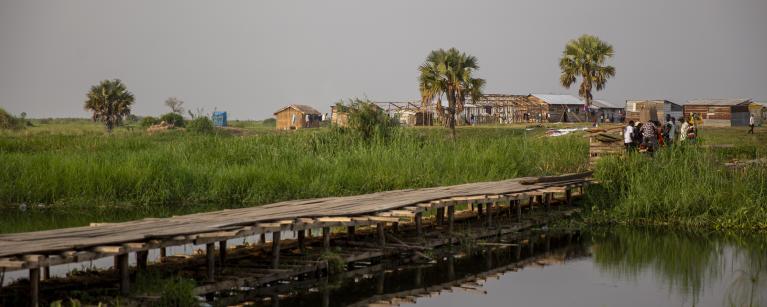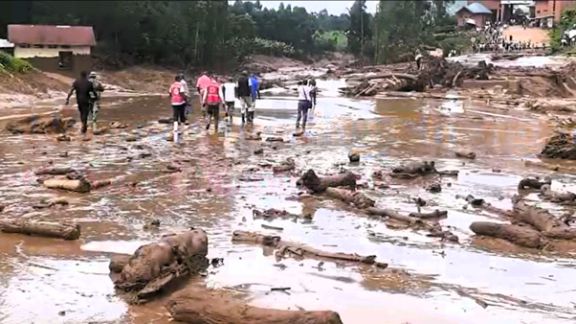
Sections of entire town centers were washed away when River Nyamugasani in Kasese district flooded in April – May 2023 and the same period in 2024. Source World Voices Uganda, 2025
In Western and Southwestern Uganda, humanitarian crises happen too often. Sudden heavy rains cause rivers to overflow, flooding entire villages, coupled with mudslides and landslides destroyed homes, infrastructure, livestock, and crops, leaving many people without a place to live or a way to support themselves.
At the same time, the region is dealing with a constant influx of refugees fleeing conflict from the Democratic Republic of Congo, which adds to the challenges faced by local communities and thus compounding the vulnerability of already vulnerable communities.
For years, when emergencies struck, local organisations had to wait through long bureaucratic fundraising processes, especially with international organisations. By the time aid finally arrives, response and recovery efforts would have less impact on the immediate needs of the affected populations since the extent of damage will be great.
In the Spirit of strengthening the local humanitarian leadership, something is changing now. In 2022 and with support from Oxfam in Uganda, the Western Uganda Humanitarian Platform (WUHP) was established, and it seeks to position local/national humanitarian actors to advance a common voice in influencing the Humanitarian agenda and providing timely emergency response that meets humanitarian standards.
Coordinated by World Voices Uganda and with support from Oxfam, WUHP is shifting the power of humanitarian response into the hands of over fifty-six local organisations comprise of local/national actors, and the refugee led organizations who are best situated to provide timely lifesaving assistance and hold duty bearer accountable through policy influencing to change practice, behavior and attitudes aimed at ensuring improved services delivery and observance of human dignity.
Through a joint mechanism that was launched in 2022 and rolled out between 2023 and 2024, the Emergency Response Fund (ERF) is enabling local organizations’ access to resources within the 72 hours of a crisis, allowing them to act immediately, save lives, and support families with hope to recover from shock and emergency.
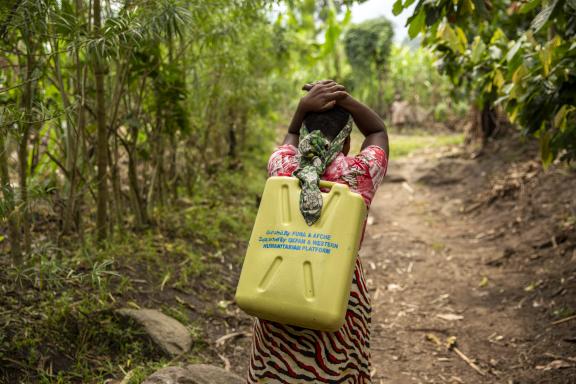
A project participant from Kyarumba subcounty, Kasese district ferrying water for household use using the relief jerrycan distributed by FURA
Acting Fast/Action Counts: How Local Organizations Responded to May 2023 and May 2024 Flooding in Kasese, Ntoroko, Bundibugyo and Kyegegwa
When the banks of the Nyamwamba and Nyamugasani rivers in Kasese broke, it resulted in devastating floods that swept through communities, leaving thousands without homes. The response from WUHP partners was swift and decisive. Local Non-Governmental Organizations (NGOs), including those led by women-led groups, refugees, youth, and people living with disabilities, sprang into action almost immediately.
They participated in emergency coordination meetings, assessed the situation on the ground, wrote funding concept notes/proposals to WUHP.
The platform committee made quick assessment to the funding concepts, released funds to the local actors, and deployed teams within hours, conducted quick assessment to establish the level of damage caused and the needs of the affected population ,delivering essential relief, including food, blankets, hygiene kits, and emergency shelter, within just 72 hours through a flexible procurement processes while ensuring, the items do not cause harms to the project participants.
Catherine Nakasinde, a Communications and Advocacy Officer with the African Women and Youth Action for Development (AWYAD) Uganda, which currently chairs the WUHP, reflected on the urgency they attached to facilitating local actors under the ERF:
“We couldn’t afford to wait. Thanks to the Emergency Response Fund, we acted quickly. There were no long processes or delays. We issued a call for proposals and, as a committee, vetted and gave grants to successful local actors all within 12 hours; this ensured that they reached affected communities within 72 hours."
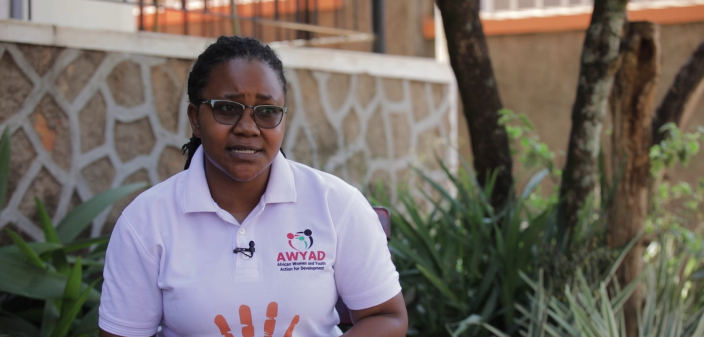
Catherine Nakasinde, the Communications and Advocacy Officer with the African Women and Youth Action for Development (AWYAD) Uganda, which currently chairs the WUHP, reflected on the urgency they attached to facilitating local actors under the Emergency Response Fund.
This rapid response not only aided those affected by the floods but also provided critical support to refugees fleeing armed conflict from the Democratic Republic of Congo (DRC) in October 2024. At the Bubukwanga Transit Camp in Bundibugyo, hundreds arrived with just a little more than the clothes on their backs.
The local organization, United Children Integrated Development Action (UNCIDA) Uganda, was there to offer much-needed assistance. Among the refugees was Sakina Bulange Sarah, a 21-year-old from Bunia City. “When I came here, I had no extra clothes, food, or soap. I didn’t know how I would survive. UNCIDA and Oxfam provided us with food, buckets, soap, and sanitary pads. I felt dignified again. Now, my dream is to continue my education and rebuild my life.”
Similarly, Matonde Vena, who fled Goma city, found solace in the relief items provided. “Life as a refugee is tough. We arrived with almost nothing, but the blankets, food, and hygiene kits have helped us restore our dignity.”
“Life as a refugee is tough. We arrived with almost nothing, but the blankets, food, and hygiene kits have helped us restore our dignity.”
Risk Management and Accountability
With fast funding comes great responsibility. Every shilling must be tracked, and every organization must be accountable. WUHP has built a strong system to manage risks and ensure transparency. Before any funds are disbursed, local partners go through a Partner Risk Assessment (PRISMA), evaluating their financial management systems, governance, and safeguarding policies.
Once funding is approved, organizations submit detailed budgets and standardized financial reports. To prevent misuse, WUHP conducts random financial audits and real-time monitoring visits to project sites. In addition, the local government authorities are on hand to ensure alignment, ownership, and accountability across all local actor-led humanitarian activities during the response.
Leaving No One Behind: Inclusive and Safe Programming
Disasters affect everyone, but recovery isn’t the same for all. People living with disabilities (PWDs) are often overlooked in emergency responses, facing unique challenges during crises. Recognizing this need, WUHP’s partner, Creation Forum Africa (CFA), stepped in to provide specialized support to five PWDs impacted by landslides in Kyarumba Sub-county, Kasese District.
They ensured these individuals received essential food relief and hygiene kits. Tembo Amos Kabadi from CFA emphasizes the importance of inclusion.
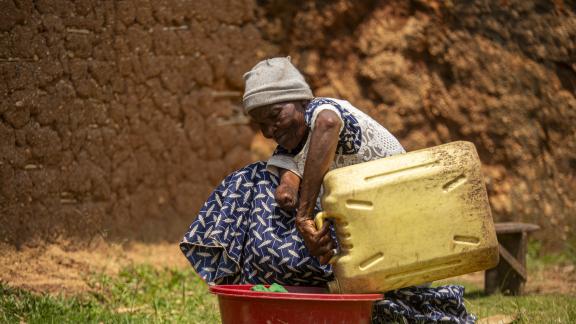
74-year-old Kabugho Sophia of Kyarumba Subcounty, Kasese, a PWD who is supported by the Western Uganda Humanitarian platform through CFA, does her laundry with the hygiene kits (basin and jerrycan) provided by the organisation.
They ensured these individuals received essential food relief and hygiene kits. Tembo Amos Kabadi from Creation Forum Africa emphasizes the importance of inclusion.
“People with disabilities are often forgotten in emergency responses. By prioritizing their needs, we made sure no one was left behind."- Tembo Amos Kabadi.
In addition to these vital initiatives, each of the WUHP partners has undertaken essential training that incorporates community dialogues and case-by-case sessions focused on safeguarding and safe programming.
This approach ensures that project participants who are most vulnerable to sexual and gender-based violence and exploitation are protected and empowered with the knowledge necessary to mitigate such risks.
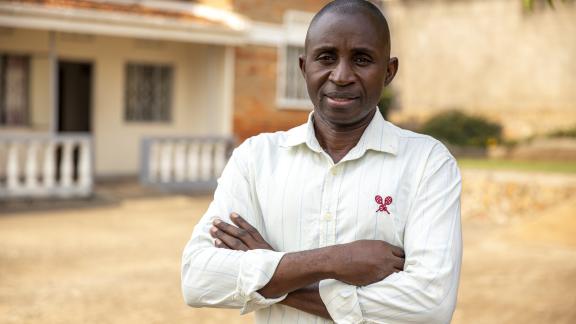
Thembo Amos Kabadi, of Creation Forum Africa emphasizes the importance of inclusion to ensure that all vulnerable groups are supported.
Lessons from the Ground and the Future of Local Response
With $70,000 provided by Oxfam under the ERF and reaching up to 56,272 project participants in two years (2022-2024); these include: 29,571 women,26,701 men,16,880 children and 612 PWDS.
The funding provided by Oxfam to local actors for immediate response efforts had a substantial and timely impact, as evidenced by the results mentioned above. Increasing financial support to these local entities could enhance their outreach and help prevent further damage and risks.
WUHP advocates for direct donor partnerships, ensuring that international funds go straight to local organizations instead of being filtered through multiple layers of bureaucracy. The platform is also calling for long-term contingency funds so that local responders always have resources available, even before disaster strikes.
“The more we invest in local organizations' financial capacity, the more we reduce dependency on external actors, this is what true localization and the future of humanitarian response looks like,” says Gard Benda, the Country Director of World Voices Uganda. “When local actors lead, recovery is faster, smarter, and more sustainable.”
The Emergency Response Fund (ERF) has not only provided urgent relief but also enhanced community resilience, advanced gender inclusion, and strengthened local humanitarian leadership. Investing in locally led response mechanisms is not just an option, it is the future of effective humanitarian action.
“The more we invest in local organizations' financial capacity, the more we reduce dependency on external actors, this is what true localization and the future of humanitarian response looks like.”
"We need to move beyond reactionary measures and focus on prevention and mitigation strategies. This includes identifying buffer zones, implementing early warning systems, and ensuring sustainable relocation plans before disasters strike," notes Kikusa Musa, Emergency Response Focal Person, Kasese District Local Government.
